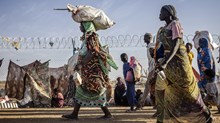General philanthropic giving is decreasing as the economy worsens, The Chronicle of Philanthropy reported earlier this month. But experts say church giving will likely increase for at least the next year.
Economists are unwilling to predict the length and depth of a potential economic recession, said Wheaton College professor of economics P. J. Hill, although they agree that the economy is slowing down.
"It's early to make an assessment about whether we are going into a very short, sharp one, or whether it's going to be an extended period of time say two or three years," Hill said. "There's a huge amount of controversy about how long and how deep it is going to be."
Despite the recession, "the fundamentals of the economy remain strong," as they say—at least for church giving.
Based on past recessions, church members will keep giving to their congregations, at least for now, said Sylvia Ronsvalle, executive vice president of empty tomb inc., a research ministry based in central Illinois.
"The data suggest that decreasing giving is not the first thing church members do in tough economic times," said Ronsvalle, who has been studying Christian giving in detail since 1988. "If this is an extended downturn, in the second year you might begin to see a retraction in church-member giving."
In fact, Ronsvalle's research shows that church giving as a percentage of income was higher during the early years of the Great Depression — around 3.5 percent — than at any point since then.
By the end of the Great Depression, however, church giving had crashed to 1.5 percent of members' income. Data from the last six recessions show mixed results—in three of the recessions giving declined, while in three it increased—but only in 1970 did giving go down in the first year of the recession.
High levels of giving might be due to the close relationship peoples have in the church, Ronsvalle said.
"People have traditionally viewed [the church] just beyond the family in terms of accountability," she said. "People go on a regular basis and hear about the needs, those are made real to them."
General giving outside the church is spottier, although people tend to give if they see an immediate need, Ronsvalle said.
"The most common stewardship approach tends to be crisis fundraising — whether it's the Myanmar problems or earthquakes in China or whether it's that the boiler's going out and people don't have boilers or furnaces."
Copyright © 2008 Christianity Today. Click for reprint information.
Related Elsewhere:
Arthur Brooks writes about the relationship between giving, religion, and the economy in The New York Sun.
Christianity Today has a special section on the economic crisis, which includes:
Christian Financial World Sees Silver Lining in Banking Mess | Firms have generally avoided debt and speculative practices, experts and insiders say. (September 29, 2008)
God Is In Control During the Financial Crisis | God often uses adversity for his greatest blessings and the markets are his. (October 2, 2008)

Support Our Work
Subscribe to CT for less than $4.25/month


















